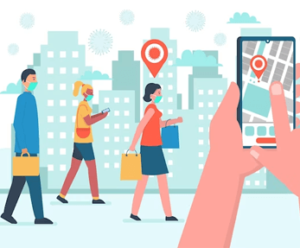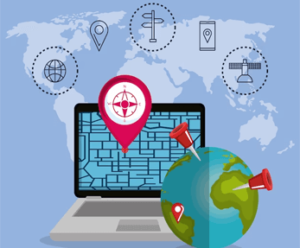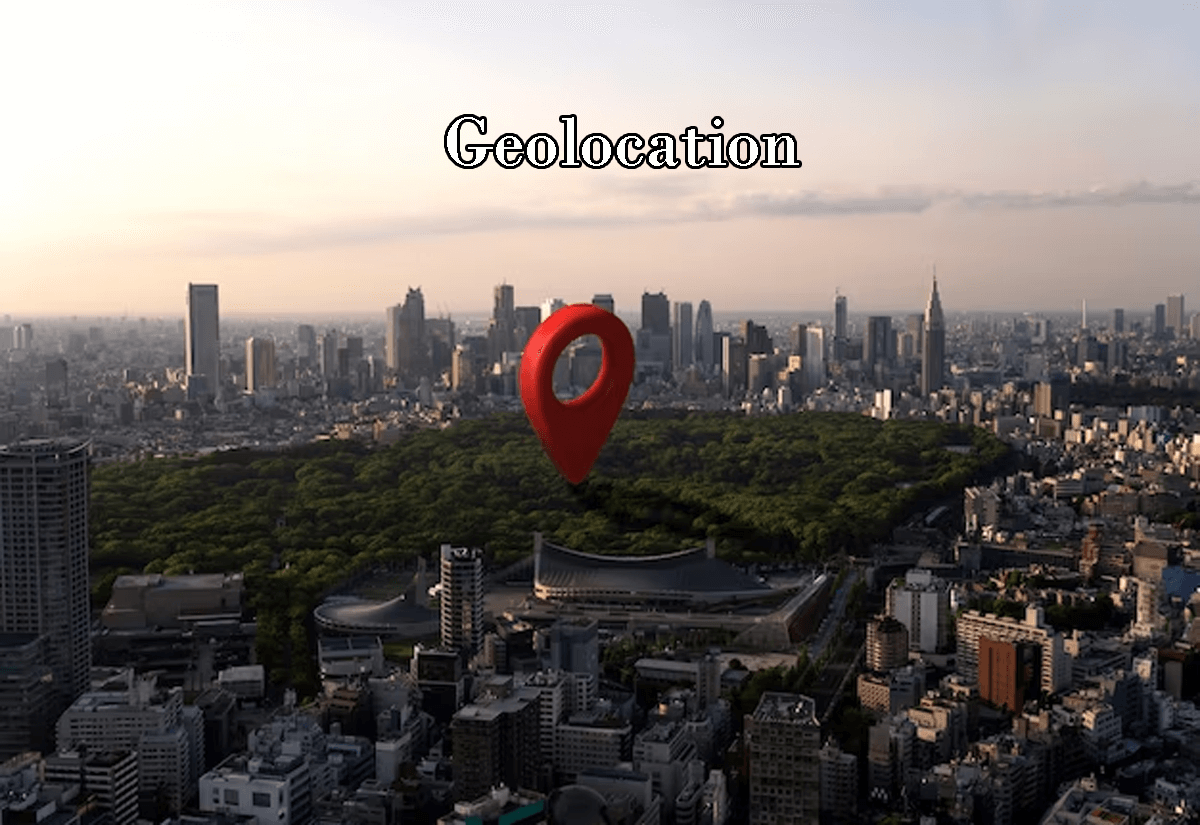What's Inside?
What is geolocation and how does it work?
Geolocation is the process of determining the location of an object or person using technology such as GPS, Wi-Fi, or cell tower triangulation. It works by analyzing data from these sources to pinpoint the location of the object or person.
GPS (Global Positioning System) uses satellites to determine the location of an object or person on the earth’s surface. Wi-Fi geolocation works by analyzing the signal strength and unique identifier of nearby Wi-Fi networks to determine location. Cell tower triangulation uses the signal strength of nearby cell towers to determine the approximate location of an object or person.
Once the geolocation technology has determined the location, it can be used in a variety of ways, such as providing location-based services, delivering targeted advertising, improving logistics and supply chain management, and enhancing safety and security.
Importance of geolocation in marketing and advertising
Geolocation is extremely important in marketing and advertising because it enables businesses to target their advertising and promotional messages to specific geographic locations, which can lead to higher conversion rates and a better return on investment (ROI).
By using geolocation data, marketers can create targeted campaigns that are tailored to the needs and preferences of consumers in specific locations. This can include everything from local promotions and events to personalized content and advertising based on local weather or cultural events.
Geolocation also enables businesses to track the effectiveness of their advertising campaigns by analyzing customer behavior and engagement in different geographic regions. By doing so, businesses can refine their marketing strategies and better understand their customers’ needs and preferences.
In addition, geolocation data can be used to enhance the customer experience by providing personalized recommendations and services based on a customer’s location. For example, a retail store can use geolocation data to send customers personalized promotions when they are near the store, while a restaurant can use geolocation data to offer customers personalized menu recommendations based on their location and preferences.
Geolocation is a powerful tool that can help businesses to better understand and engage with their customers, improve their marketing strategies, and ultimately drive growth and profitability.
Geolocation-based mobile apps and their benefits
Geolocation-based mobile apps are designed to use the location data from a user’s mobile device to provide targeted and relevant services. Here are some benefits of using geolocation-based mobile apps:
- Personalized services: Geolocation-based mobile apps can provide personalized services based on the user’s location. For example, a weather app can provide weather updates based on the user’s location, a travel app can provide recommendations for nearby attractions and restaurants, and a fitness app can track the user’s workout progress based on their location.
- Improved customer engagement: By providing personalized and location-specific services, geolocation-based mobile apps can improve customer engagement and loyalty. This is because users are more likely to use an app that provides them with relevant information and services based on their location.
- Increased efficiency: Geolocation-based mobile apps can help users to save time and increase efficiency by providing them with information and services that are relevant to their location. For example, a navigation app can provide users with the quickest route to their destination based on their current location.
- Enhanced safety and security: Geolocation-based mobile apps can help users to stay safe and secure by providing them with location-specific alerts and warnings. For example, a weather app can provide users with severe weather alerts for their current location, while a security app can alert users if they are entering a dangerous area.
- Business benefits: Geolocation-based mobile apps can provide businesses with valuable location-based data that can be used to improve their marketing and sales strategies. By analyzing the location data of their customers, businesses can gain insights into customer behavior and preferences, and target their marketing efforts more effectively.
Geolocation-based mobile apps have numerous benefits for users and businesses alike, and are an important tool for providing targeted and relevant services based on a user’s location.
Role of geolocation in location-based services
 Geolocation plays a crucial role in location-based services (LBS). Location-based services are services that utilize the location of a user’s device to provide targeted and relevant services. Geolocation is the process of identifying the geographical location of a device or a user by using various technologies such as GPS, Wi-Fi, and cellular networks.
Geolocation plays a crucial role in location-based services (LBS). Location-based services are services that utilize the location of a user’s device to provide targeted and relevant services. Geolocation is the process of identifying the geographical location of a device or a user by using various technologies such as GPS, Wi-Fi, and cellular networks.
Here are some of the ways geolocation is used in location-based services:
- Navigation: Navigation apps such as Google Maps and Waze use geolocation to provide turn-by-turn directions and real-time traffic updates based on the user’s location.
- Local search: Local search services such as Yelp and Foursquare use geolocation to provide users with information about nearby restaurants, shops, and other businesses.
- Weather updates: Weather apps such as AccuWeather and The Weather Channel use geolocation to provide users with real-time weather updates and alerts for their current location.
- Social networking: Social networking apps such as Facebook and Instagram use geolocation to enable users to share their location with friends and family, and to discover new places and events nearby.
- Marketing and advertising: Geolocation is also used by marketers and advertisers to provide targeted and personalized advertising based on the user’s location. For example, a retail store can send targeted promotions to customers who are nearby, and a restaurant can send special offers to customers who are in the vicinity.
Geolocation is a critical component of location-based services, enabling businesses and organizations to provide targeted and relevant services to users based on their location.
Privacy concerns related to geolocation and how to address them
Privacy concerns related to geolocation arise from the fact that geolocation data can reveal sensitive information about a user’s movements, habits, and whereabouts. If this data is accessed or used by unauthorized parties, it can be used to track or monitor a user’s activities, or even to harm them.
Here are some of the common privacy concerns related to geolocation, along with some ways to address them:
- Data collection and storage: Geolocation data is typically collected and stored by apps and services that use it, raising concerns about who has access to the data and how it is used. To address this, users can review app permissions and settings to ensure that they are only sharing geolocation data with trusted apps and services, and that the data is not being stored or shared without their consent.
- Data security: Geolocation data can be sensitive, and if it falls into the wrong hands, it can be used for malicious purposes. To address this, apps and services should use robust data encryption and security measures to protect geolocation data from unauthorized access and use.
- Transparency and consent: Users should be informed about what data is being collected and how it is being used, and should have the option to opt-out or delete their data if they choose to do so. Apps and services should be transparent about their geolocation data practices and obtain explicit consent from users before collecting or using their data.
- Legal and regulatory compliance: Geolocation data is subject to a range of privacy laws and regulations, such as the General Data Protection Regulation (GDPR) in the EU and the California Consumer Privacy Act (CCPA) in the US. To address this, businesses and organizations should ensure that they are compliant with relevant laws and regulations, and that they are using geolocation data in a lawful and ethical manner.
Privacy concerns related to geolocation can be addressed through a combination of technical, organizational, and legal measures, as well as user education and awareness. By taking steps to protect geolocation data and respect user privacy, businesses and organizations can build trust and confidence with their users, while also delivering valuable and relevant location-based services.
Impact of geolocation on the retail industry
Geolocation has had a significant impact on the retail industry in recent years. It has enabled retailers to offer location-based services and personalized experiences to their customers. Here are some ways in which geolocation has impacted the retail industry:
- Targeted marketing: Geolocation allows retailers to target their marketing campaigns to specific geographic locations. By knowing where their customers are located, retailers can send them personalized offers and promotions that are relevant to their location and preferences.
- Improved customer experience: With geolocation-based apps, retailers can offer personalized experiences to their customers. For example, a retail app can offer customers personalized product recommendations based on their location, previous purchases, and browsing history.
- Increased foot traffic: Geolocation-based marketing can help drive foot traffic to physical stores. By sending targeted offers and promotions to customers who are in close proximity to a store, retailers can encourage them to visit the store and make a purchase.
- Operational efficiencies: Geolocation can also help retailers optimize their operations. For example, retailers can use geolocation data to optimize their supply chain and logistics operations, and to track the location of their inventory in real-time.
- Competitive advantage: Geolocation-based services can give retailers a competitive advantage by offering unique and personalized experiences to their customers. By using geolocation to deliver personalized offers, promotions, and recommendations, retailers can differentiate themselves from their competitors and build stronger relationships with their customers.
Geolocation and social media: opportunities and challenges
Geolocation has had a significant impact on social media in recent years. It has enabled social media platforms to offer location-based services and personalized experiences to their users. Here are some opportunities and challenges related to geolocation and social media:
Opportunities:
- Targeted advertising: Geolocation allows social media platforms to offer targeted advertising to businesses. By knowing where their users are located, social media platforms can help businesses reach their target audience more effectively.
- Personalized experiences: With geolocation-based services, social media platforms can offer personalized experiences to their users. For example, a social media app can offer users personalized content and recommendations based on their location.
- Real-time updates: Geolocation allows social media platforms to offer real-time updates to their users. For example, users can receive updates about events and activities that are happening in their area.
- Enhanced engagement: Geolocation-based services can help social media platforms enhance user engagement. By offering personalized content and recommendations, social media platforms can keep users engaged and interested in their platform.
Challenges:
- Privacy concerns: Geolocation raises privacy concerns, as users may not want to share their location data with social media platforms. Social media platforms need to be transparent about their use of geolocation data and give users control over their location settings.
- Data accuracy: Geolocation data is not always accurate, which can lead to incorrect recommendations and offers being sent to users. Social media platforms need to ensure that their geolocation data is accurate and up-to-date.
- Security risks: Geolocation data can be used by hackers to track users and steal personal information. Social media platforms need to ensure that their geolocation data is secure and protected from hackers.
- Technical challenges: Geolocation-based services can be technically challenging to implement, particularly in areas with poor network coverage. Social media platforms need to ensure that their geolocation services are reliable and work seamlessly across different devices and networks.
Geolocation and transportation: optimizing routes and improving efficiency
 Geolocation technology has a significant impact on the transportation industry, including optimizing routes, reducing costs, and improving overall efficiency. Here are some ways geolocation is being used in transportation:
Geolocation technology has a significant impact on the transportation industry, including optimizing routes, reducing costs, and improving overall efficiency. Here are some ways geolocation is being used in transportation:
- Vehicle tracking and fleet management: Geolocation technology enables real-time tracking of vehicles, which helps fleet managers optimize routes, improve delivery times, and reduce fuel consumption. Fleet management systems use geolocation data to monitor vehicle performance, driver behavior, and maintenance schedules.
- Location-based services for drivers: Geolocation technology is used to provide location-based services for drivers, including navigation and route optimization, traffic updates, and real-time weather information. These services help drivers avoid traffic congestion, reduce travel time, and improve safety on the road.
- Asset tracking: Geolocation technology is also used to track and monitor high-value assets, such as cargo containers and equipment, in real-time. This helps transportation companies optimize logistics, reduce theft, and improve overall supply chain efficiency.
- On-demand transportation services: Geolocation technology has enabled the rise of on-demand transportation services, such as ride-sharing and food delivery apps. These services use real-time location data to match customers with nearby drivers, reducing wait times and improving overall customer experience.
Geolocation technology is revolutionizing the transportation industry, enabling companies to optimize logistics, reduce costs, and improve efficiency.
Future of geolocation technology and its potential applications
Geolocation technology has come a long way in recent years, and its potential applications continue to expand. Here are some potential areas where geolocation technology could be used in the future:
- Augmented reality: Geolocation technology could be used to create augmented reality experiences that are based on the user’s location, making the experience more immersive and personalized.
- Smart cities: Geolocation technology could be used to create smarter cities by improving traffic flow, public safety, and urban planning.
- Personalized marketing: Geolocation technology could be used to create more personalized marketing campaigns that are tailored to the user’s location, interests, and preferences.
- Healthcare: Geolocation technology could be used to track patients’ locations and provide more personalized healthcare services.
- Wearables: Geolocation technology could be used to power the next generation of wearables, providing more accurate tracking and personalized experiences.
- Logistics and supply chain: Geolocation technology could be used to optimize logistics and supply chain operations, improving efficiency and reducing costs.
The potential applications of geolocation technology are vast, and we are likely to see even more innovative uses in the future. However, as with any technology, it’s important to consider the potential ethical and privacy concerns that may arise with its use.
Best practices for businesses using geolocation-based services
Here are some best practices for businesses using geolocation-based services:
- Obtain user consent: Always obtain user consent before collecting and using their location data. Make sure to provide clear information on how their data will be used and assure them that their data will be kept secure.
- Provide value: To encourage users to share their location data, provide them with value in return. This could include personalized recommendations, location-based discounts, or improved services.
- Use accurate data: Ensure that the location data you collect is accurate and up-to-date. Inaccurate data can lead to poor user experiences and can damage your brand’s reputation.
- Be transparent: Be transparent about how you are using location data. Clearly explain what data you are collecting, why you are collecting it, and how you will use it.
- Secure data: Keep location data secure and protect it from unauthorized access or use. Use secure data storage methods and regularly review your security protocols.
- Respect privacy: Respect user privacy by only collecting the data that is necessary and relevant to your business. Avoid collecting sensitive information that could compromise user privacy.
- Follow regulations: Follow local and national regulations regarding data privacy and security. Be aware of changes in regulations and adjust your practices accordingly.
By following these best practices, businesses can use geolocation-based services in a way that respects user privacy and provides value to both the business and the user.


